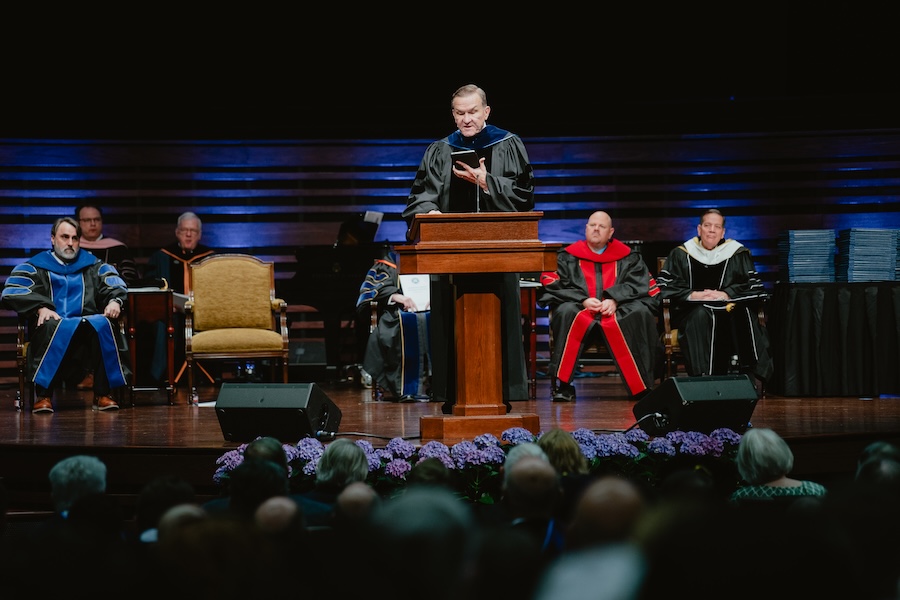Smith urges ministers to take heed of self, teachings in Southwestern Seminary chapel message

During his September 30 chapel message at Southwestern Baptist Theological Seminary and Texas Baptist College, Kevin Smith encouraged the assembly to guard themselves and their teaching as Paul instructed Timothy in the letter to his disciple.
In his introduction of Smith, Southwestern Seminary’s Interim Provost David S. Dockery said Smith is someone he has “admired” for his commitment to racial reconciliation, zeal for the Great Commission, preaching abilities, love for the church, and “his significant efforts to promote unity among the people of God and live out Jesus’ prayer in John chapter 17.”
Smith, who served the last five years as the executive director of the Baptist Convention of Maryland and Delaware, recently transitioned to the roles of pastor of Family Church Village and teaching pastor of the Family Church Network in West Palm Beach, Florida. Smith has served the Southern Baptist Convention in a variety of roles, including as an assistant professor of church history and Christian preaching at Southern Baptist Theological Seminary in Louisville, Kentucky, and president of the Kentucky Baptist Convention.
In his message, based on 1 Timothy 4:16 and Paul’s exhortation to Timothy as he pastored the church at Ephesus, Smith said while there are many things that matter in pastoring a church, there are two indispensable things for pastors: taking heed of themselves and of their teachings.
“I think we can acknowledge that we’ve seen people failing to pay close attention to themselves” and the doctrine they teach, Smith said. “Those are the most essential things” as the “fruitfulness of the congregation” is determined by the pastor and his teachings.
In taking heed of themselves, Smith said faithful ministers are never fully grown because they are continuously “shaped by people” that God uses in their lives.
Acknowledging Dockery, Smith said his approach to relationships has been shaped by the Southern Baptist statesman. At the beginning of his message, Smith said, “The Southern Baptist Convention is large, millions of people, but I can say in a singular man, the way I have thought about conflict, the way I have thought about anger, the way I have engaged people has been singularly shaped by observing Dr. Dockery.”
Smith encouraged the gathering that God is using others to continuously shape them, too.
“The culture celebrates the self-made man or the self-made woman, but there is no self-made anyone in the Kingdom of God,” Smith said.
Directing the audience to 1 Timothy 1:12-16, Smith said ministers need to remember they are recipients of strength and grace from the Lord.
“Part of taking heed unto yourself is keeping a certain type of … Christian humility about yourself,” Smith noted. “We truly are who we are by the grace of God. We truly are who we are by the mercy of God.”
Smith said it is the mercy of the Lord that makes one righteous and the Christian needs to “maintain a certain type of humility just knowing that we are saved and we are who we are because of the strength and the mercy of Jesus Christ.”
Cautioning the assembly to remember they are engaged in a “good warfare” Smith told the gathering they should “not be presumptuous,” but pay close attention to their walk with the Lord.
“Don’t put yourself on cruise control [or] auto-pilot,” Smith said. “The Christian life is a stick shift with a clutch and you got to work that thing. Work out your salvation with fear and trembling.”
Smith urged “pastors to be content being pastors” rather than seeing the role of a pastor as a “hobby” or a “part-time gig.”
“When I was called to the ministry it was a consuming thing of my life and I’m so happy to be a pastor,” Smith said. “You might be co-vocational or bi-vocational or full-time but you are … a pastor of God’s people.”
Smith said pastors taking care of themselves includes the basics of pastoral character because the task of pastoring is “a noble task in the eyes of a Holy God” and encouraged the gathering to examine themselves before they engage in any form of ministry.
Smith said if pastors are not failing in their personal lives, then they are failing because they are not watching over the things they are teaching.
“So if Christian leaders and speakers and pastors and shepherds are not crashing in their personal life they’re crashing in what they’re teaching,” Smith observed. “Either not fully teaching all of Scripture, yet saying they believe in the sufficiency of Scripture. Or not consecutively teaching through the Scripture, which allows you to teach the breadth of Scripture and so they spend time avoiding sins that they see within their congregation because they’re too cowardly to address those things when the text addresses those.”
As part of paying attention to their teachings, Smith said, “I think you always have to guard the truthfulness, the authority, the inerrancy, and the sufficiency of Scripture, and by guarding that you guard the exclusivity of Christ and the Trinitarian nature of God.”
Smith said throughout the history of the church, these three must always be guarded.
Smith concluded by encouraging the gathering to guard the Gospel as Paul admonished Timothy in 1 Timothy 1:11.
“Preserve, teach the Gospel,” Smith declared emphatically. “We must guard the broad nature of the Gospel gift. God desires that all would be saved and come to the knowledge of the truth.”
The entire sermon can be viewed here.
Chapel is held every Tuesday and Thursday morning at 10 a.m. (CT) in MacGorman Chapel on the campus of Southwestern Seminary. Chapel may be viewed live at swbts.edu/live.



